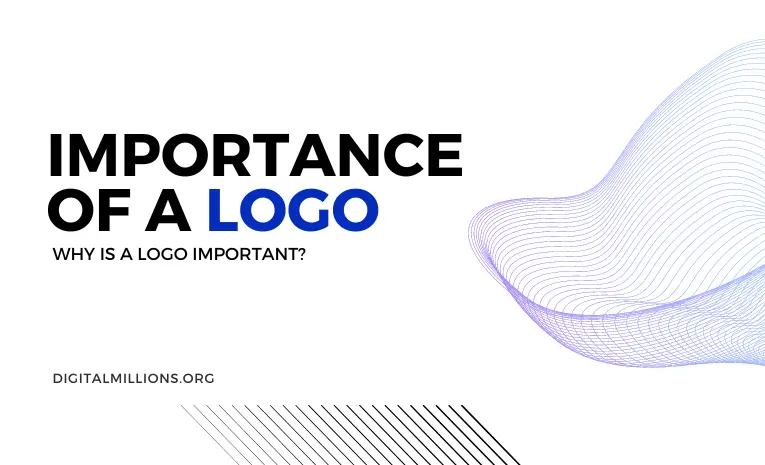In the business world, a logo is more than just a symbol – it’s a crucial element that can make or break a brand. This blog explores why having a logo is a must, shedding light on some of the crucial reasons.
From building your brand’s identity to making it easily recognizable, we’ll explore how a well-designed logo is not just a choice but a smart move in today’s competitive market. Join us as we discuss the importance of logos and learn why they are key to a successful and lasting brand strategy.
Before we begin, let’s first understand the science behind logos.
What is a Logo?

A logo is a visual symbol that represents a brand, company, product, or organization. It is a concise and distinctive graphic design that serves as a unique identifier, making it easily recognizable and memorable to the target audience. Logos play a key role in establishing brand identity and conveying the essence of a business or entity.
They often incorporate carefully chosen colors, fonts, and images to communicate a specific message or evoke particular emotions. A well-designed logo is not only aesthetically pleasing but also functional, effectively representing the values, mission, and personality of the brand.
Whether displayed on business cards, websites, products, or marketing materials, a logo serves as a visual cornerstone, fostering brand loyalty and leaving a lasting impression in the minds of consumers.
Importance of a Logo for Businesses
1. Brand Recognition
A well-crafted logo is a visual representation of a business and plays a crucial role in creating brand recognition. This, in turn, aids customers in effortlessly identifying and remembering a company, even amidst the sea of competitors.
Additionally, a memorable logo can evoke positive emotions and associations, contributing to a favorable perception of the brand in the minds of consumers.
2. First Impression
A logo is often the first thing a potential customer notices about a business. It serves as a quick and impactful introduction, shaping the initial perception of the brand. A visually appealing logo can leave a positive and lasting first impression.
3. Professionalism
A good logo conveys a sense of professionalism and credibility. It reassures customers that the business is serious and committed to its products or services, instilling confidence and trust.
4. Differentiation
A unique and distinctive logo helps a business stand out from its competitors in a jam-packed marketplace. It acts as a visual identifier that sets the brand apart and makes it unforgettable.
Furthermore, a well-crafted logo not only communicates the essence of the brand but also establishes a lasting connection with the target audience, contributing to long-term brand loyalty and recognition.
5. Brand Consistency
A logo is a key element in maintaining brand consistency across various marketing materials and platforms. Whether it’s on business cards, website, or social media, a consistent logo reinforces the brand message and identity.
6. Communication
Logos communicate a company’s values, mission, and personality without the need for extensive text. The design elements and color choices in a logo can convey specific messages that resonate with the target audience.
7. Marketing Tool
Logos are powerful marketing tools. They can be used in advertising, promotional materials, and various media channels to create a cohesive and recognizable brand image, enhancing the effectiveness of marketing campaigns.
8. Memorability
People tend to remember visual images more effectively than text. A well-crafted logo increases brand recall, helping customers remember the business and its offerings when making purchasing decisions.
9. Adaptability
A versatile logo design is essential for its adaptability to different mediums and sizes. Whether it’s on a small business card or a large billboard, a well-designed logo remains clear and recognizable.
10. Customer Loyalty
Over time, a logo becomes synonymous with a brand’s reputation and customer experiences. Seeing a familiar logo can evoke positive emotions and a sense of loyalty, encouraging repeat business and fostering a strong connection between the brand and its customers.
What Makes a Great Logo?
Now that we know the importance of a logo for your brand, it’s equally important to understand the key characteristics that make a good logo.
So start your hunt for a logo designer near me, and choose the one that fully understands the following concepts that can make or break your logo.
1. Simplicity
Great logos are often simple and easily recognizable. A clean and uncluttered design ensures that the logo is easily memorable and can be quickly identified, making it more effective in leaving a lasting impression on the audience.
2. Memorability
A strong logo should be memorable, allowing people to easily recall and recognize it even after a brief exposure. This helps in building brand awareness and creating a connection with the audience over time.
3. Versatility
A successful logo design should be versatile and work well across various mediums and applications. Whether on a website, a business card, or a billboard, a great logo remains effective and retains its visual impact.
4. Relevance to the Brand
The best logos reflect the essence and values of the brand they represent. The design elements, colors, and imagery should align with the company’s identity, helping to communicate its mission, values, and personality.
5. Timelessness
A great logo stands the test of time. While trends come and go, a timeless design remains relevant and avoids becoming outdated. This ensures that the logo maintains its effectiveness and appeal over the years, contributing to the long-term success of the brand.
6. Scalability
A well-designed logo should be scalable without losing its clarity and impact. Whether it’s displayed on a small business card or a large billboard, the logo should retain its visual integrity and remain recognizable at different sizes. This scalability ensures that the logo is adaptable to various marketing and branding needs.
Final Thoughts on Logo
A logo is not just a visual component; it’s a powerful tool that shapes your brand identity and fosters recognition.
By understanding and implementing the key characteristics of a good logo, you pave the way for a stronger and more memorable brand presence in the market.


